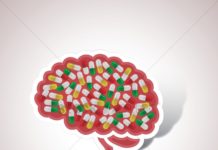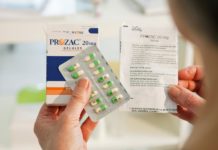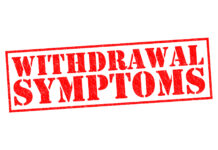Antipsychotic Dose Reduction Linked To Long-term Improvements In First-Episode Schizophrenia Patients
Careful reductions in dosage levels of antipsychotic medications over time improved long-term rates of recovery and functional remission in patients diagnosed with a first-episode psychosis.
Prescribers Often Fail to Support Patients Discontinuing Antidepressants, Study Finds
Study reveals most patients are dissatisfied with prescribers' support when discontinuing antidepressants.
Over One Thousand Boys Grew Breasts “Probably” Caused By Common Psychiatric Medication
According to an ex-chief of the FDA, Johnson & Johnson knew long before it started warning people that Risperdal could cause boys to grow breasts.
No Good Evidence That Antidepressants Prevent Relapse
Trials of antidepressants for relapse prevention are confounded by withdrawal effects caused by the drugs.
Report Calls For Policy Changes In Response To Dependence and Withdrawal From Prescribed Drugs
Statistics from the UK reveal that prescriptions for painkillers and antidepressants continue to rise despite concerns over dependence and debilitating withdrawal effects. The British Medical Association (BMA) Board of Science has released a report that acknowledges changes to medical practice, research and policy necessary for addressing the dependence and withdrawal effects of benzodiazepines, opioids, and antidepressants.
Opioid Use in Pregnancy Dangerous and Understudied
Nora Volkow, the director of the National Institute on Drug Abuse (NIDA), authored an editorial for BMJ this month warning that the opioid abuse epidemic could have dangerous consequences for pregnant women. While the effects of opioid exposure on the developing brain are yet unknown, research suggests that infants may suffer from withdrawal syndrome, nervous system defects, and impaired attachment with the mother.
“Treatment Resistant” Schizophrenia Strongly Linked to Dopamine Supersensitivity
Over 70% of schizophrenia patients who are "treatment resistant" have apparently developed dopamine supersensitivity psychosis from long-term use of antipsychotic medications.
Withdrawal Symptoms Routinely Confound Findings of Psychiatric Drug Studies
Researchers examine how rapid discontinuation can mimic the relapse of mental health symptoms and confound psychiatric drug studies.
Antipsychotic-induced Sexual Dysfunction Underreported
Researchers found some antipsychotics to be worse than others for causing sexual dysfunction.
Global Survey Leads to New Recommendations for Deprescribing Psychiatric Drugs
Growing rates of long-term psychiatric drug prescriptions and documented issues with withdrawal demonstrate a need for safe deprescribing practices.
Lack of Guidance Available for Discontinuing Psychiatric Drugs
A new article discusses the lack of research dedicated to discontinuing psychiatric drugs and reviews existing strategies.
Lithium May Cause Sexual Dysfunction — More Research Needed
Lithium appears to reduce libido and sexual function, and more research into the problem is needed.
Neuropsychological Tests Reveal Consequences of Polypharmacy
Neuropsychological assessments reveal the cognitive, occupational, and social impact of polypharmacy in psychiatry.
Psychological Interventions Can Help When Tapering Off Antidepressants
Meta-analysis of antidepressant tapering finds CBT and MBCT can aid in tapering, but limited studies met inclusion criteria.
Many Service Users Interested in Decreasing Antipsychotic Use with Professional Help
New research examines service user attitudes on discontinuing and reducing antipsychotic drugs.
Research Explores the Experience of Benzodiazepine Withdrawal
A new study reveals many benzodiazepine users are misinformed about the risks of withdrawal and experience devastating consequences.
More Psychological Supports Needed to Manage Antidepressant Discontinuation
Study reviews psychological interventions for antidepressant discontinuation.
The Ethics of Antipsychotic Dose Reduction and Patient Rights
New research highlights the ethical responsibilities of clinicians in supporting patients who choose to reduce or discontinue antipsychotic medication.
Patients Express Anger at Doctors’ Ignorance About Antidepressant Withdrawal Effects
Antidepressant users share their frustrations towards a healthcare system that overprescribes but is ill-equipped to support with discontinuation and withdrawal symptoms.
Cognitive Function Improved by Reducing Antipsychotics
A 28-week randomized controlled study by researchers in Japan, Canada and the United States finds that a 50% reduction of risperidone or olanzapine significantly...
New Study Examines User Experience of Discontinuing Psychiatric Medications
Researchers find that support and self-care were helpful for users during discontinuation, but that mental health professionals were not very helpful.
Thoughtful Insight, Not Lack of It, Drives Some Patients to Quit Psychiatric Medications
Rather than a "lack of insight," it is actually a thoughtful weighing of complex risks and benefits that ultimately drives some people diagnosed with bipolar disorder to eschew psychiatric medications, according to a qualitative study in the Journal of Affective Disorders. And these people often develop sophisticated strategies in their efforts to manage without medications.
PTSD and Antidepressants Linked to Diabetes
A JAMA Psychiatry study found links between PTSD, type 2 diabetes, and antidepressants.
New Clinical Guidelines on Deprescribing Benzodiazepines
New guidelines recommend deprescribing benzodiazepine receptor agonists for adults.
“Relapse” in Antidepressant Trials Likely Caused by Sudden Withdrawal
A new study investigates how antidepressant withdrawal effects often get confounded with depression relapse in clinical trials.

























